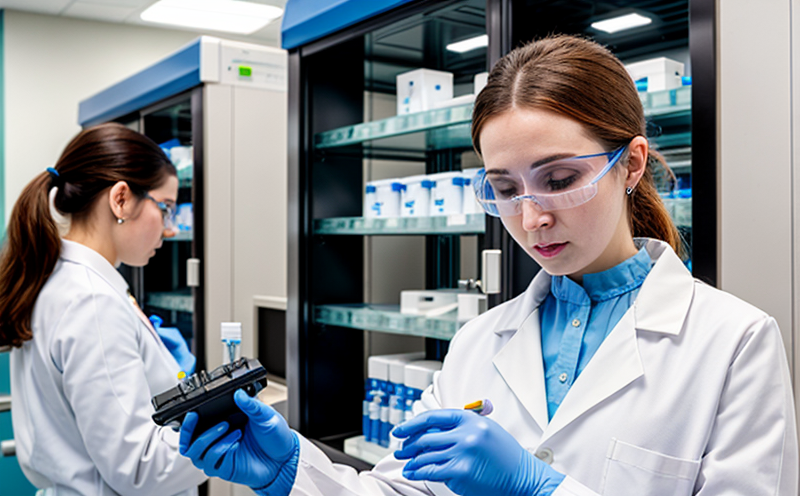Bioequivalence Study Sample Bioanalysis Testing
In the pharmaceutical industry, bioequivalence is a crucial aspect ensuring that generic drugs are as effective and safe as their brand-name counterparts. The bioequivalence study sample bioanalysis testing is pivotal in this process. This service involves detailed analytical evaluation of drug samples to determine if they can be considered bioequivalent according to regulatory standards such as the FDA, EMA, and WHO.
The primary goal of a bioequivalence study is to ensure that the generic version of a drug behaves similarly to its innovator counterpart under similar conditions. This includes assessing the absorption rate (Cmax and Tmax), peak concentration, and duration of effect in subjects. Bioanalytical testing plays a critical role by quantifying active pharmaceutical ingredients (APIs) or their metabolites within biological matrices like plasma.
The process typically begins with sample preparation where raw drug samples are processed to isolate the analytes. This could involve various chromatographic techniques including HPLC, LC-MS/MS, and other advanced analytical methods tailored for detecting even trace levels of substances. Once prepared, these samples undergo rigorous analysis using validated protocols that comply with international standards like ISO 17025.
Our service encompasses not only the technical execution but also comprehensive interpretation of results to provide actionable insights into drug performance. We employ state-of-the-art equipment and adhere strictly to Good Laboratory Practices (GLPs) to ensure accuracy and reliability of our findings. The data generated from these tests forms the backbone for regulatory approvals which are essential for market access.
Understanding bioequivalence is key not only in ensuring patient safety but also in maintaining therapeutic efficacy across different populations. By conducting thorough bioanalytical testing, we help pharmaceutical companies navigate complex regulatory landscapes confidently while enhancing public health through reliable drug development practices.
Scope and Methodology
The scope of our bioequivalence study sample bioanalysis testing includes the following key areas:
- Quantification of active pharmaceutical ingredients (APIs) or their metabolites in biological matrices such as plasma, urine, and saliva.
- Determination of pharmacokinetic parameters including Cmax (maximum concentration), Tmax (time to reach maximum concentration), AUC (area under the curve).
- Evaluation of bioavailability and bioequivalence between test and reference formulations.
We use advanced analytical techniques like High Performance Liquid Chromatography (HPLC), Liquid Chromatography-Mass Spectrometry (LC-MS/MS), and other relevant technologies to achieve precise measurements. These methods are selected based on their ability to detect minute quantities of APIs or metabolites accurately.
The methodology involves several steps starting from sample collection, processing through extraction procedures if necessary, followed by chromatographic separation and detection. Each step follows stringent quality control measures ensuring that every result is accurate and reproducible. After analysis, detailed reports are compiled summarizing all findings along with statistical evaluations comparing the test formulation against the reference standard.
Benefits
The benefits of our bioequivalence study sample bioanalysis testing extend beyond mere compliance; they significantly contribute to enhancing drug safety and efficacy. Here’s why choosing this service can be advantageous:
- Regulatory Compliance: Ensures strict adherence to international regulatory guidelines such as FDA, EMA, WHO, thereby facilitating smoother approval processes.
- Patient Safety: By confirming bioequivalence, we help ensure that patients receiving generics experience similar effects and side effects compared to branded medications.
- Economic Efficiency: Reduces costs associated with repeated unsuccessful trials by providing reliable data upfront.
- Innovation Support: Provides robust evidence supporting new formulations or modifications enhancing overall product quality.
Beyond these direct advantages, our service also fosters trust among stakeholders including healthcare providers and consumers, promoting confidence in generic products. This contributes positively towards broader adoption of generics leading to improved access to essential medicines worldwide.
Competitive Advantage and Market Impact
Our bioequivalence study sample bioanalysis testing service stands out due to several unique selling points:
- Innovative Methodologies: Utilizing cutting-edge technology including advanced chromatographic techniques ensures unparalleled accuracy in our analyses.
- Rigorous Quality Assurance: Adherence to international standards like ISO 17025 guarantees that every test meets the highest quality benchmarks.
- Comprehensive Interpretation: Our team of experts provides not just raw data but also thorough interpretations aiding in informed decision-making processes.
- Regulatory Expertise: With deep knowledge of global regulatory requirements, we ensure that all our work aligns perfectly with prevailing standards.
This combination of technical excellence and comprehensive support allows us to deliver robust bioequivalence studies that significantly enhance the competitiveness of pharmaceutical products in both domestic and international markets. Our commitment to innovation ensures that we remain ahead of industry trends contributing positively towards market leadership and sustainable growth.





